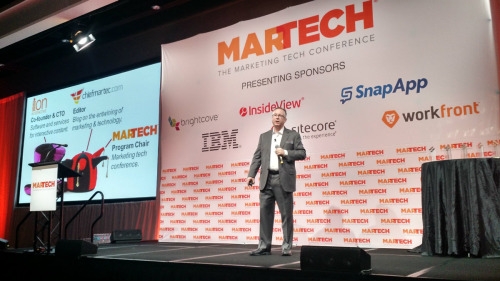
Marketers face an ever-expanding array of available technology and a need to harness it to improve their work. As a result, they are beginning to borrow from the software developer playbook, according to Scott Brinker, editor of chiefmartec.com and founder and CTO of ion interactive, in his keynote remarks at MarTech in San Francisco.
As marketing becomes a software-powered profession, Brinker said marketers can learn to adapt and “think like an engineer” using the classic agile and lean approach developers have refined over time. That approach, namely taking the time horizon of a given project and breaking it down into smaller, iterative cycles, can be applied to great effect by the marketer community.
“It is still good to have high-level strategy, but marketers have gone to a more agile approach,” Brinker said, with phased sprints along the way.
He explained that each sprint is an opportunity for marketers to:
- Respond to new events and information;
- Deploy viable work into market sooner;
- Adjust the approach based on feedback;
- Stop wasting time on ineffective programs; and
- Experiment with innovative new ideas.
“This is a great example of marketing borrowing the ideas and improvising agile to work within their organization,” Brinker said. The idea is also the foundation of his book, “Hacking Marketing,” which publishes this month.
Brinker explained that marketing used to be created at the intersection of messages – “what you say” – and media – “where you say it,” but that now marketing has added a third element: mechanism. The mechanism can be things like blogs, e-books, reports, webinars, assessments, calculators and quizzes.
That combination, he said, “is the art of communications in a digital world and the art of customer experience.”
Brinker cited a recent Dell B2B project as a good example of incorporating the third element. Dell wanted to target IT managers responsible for BYOD (Bring Your Own Device) management in their organizations. Rather than a static content asset, they devised a set of questions for this audience, which touched on concerns such as use of personal devices in the corporate network and additional questions with increasing complexity around device management. The user could take the quiz and then click to see their results. At the same time, Dell provided additional information and links to relevant Dell as well as third-party content. The campaign was successful, and Dell has continued to develop similar interactive content.
Experimentation and testing, he said, is central to an agile approach to marketing. The access to data affords marketers the ability to leverage software to see patterns in the data that were not available in the past. Brinker said, “To be able to activate data, you have to run tests.” And those tests can provide “meaningful learning that is more valuable than optimization,” he said.
He cautioned that marketers should make sure there is senior management support for testing and experimentation and a culture that encourages it.
“When you look at the way SaaS companies are doing product development, it’s all about… testing,” Brinker said. “What ultimately matters [for marketers] is using data and testing to develop remarkable customer experiences.”







